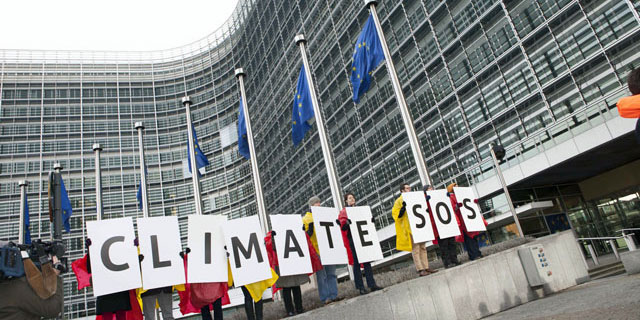The adequacy of new EU climate targets for 2030 was further undermined by the findings of the UN climate science panel’s latest report released yesterday. The report – the most comprehensive climate science review ever produced – emphasises how current climate action is dangerously inadequate, and will fail to stabilise climate pollution or avoid the worst climate impacts.
The “Synthesis Report” builds on three reports released by the Intergovernmental Panel on Climate Change (IPCC) throughout 2013-2014. The IPCC is a senior UN panel made up of thousands of scientists, and this report marks its fifth assessment since 1990 of the state of climate science and knowledge.
“The report says that current levels of climate action put us on track for as much as 7.8°C of warming by 2100 – that is an unimaginable disaster. Political decision makers and polluters must take urgent action to drastically cut fossil fuel use, and clean up the mess we have created,” said Susann Scherbarth, climate campaigner at Friends of the Earth Europe.
Last month, the EU announced its new climate targets for 2030. A 40% emissions reduction target to be broken down into 28 nationally binding targets will work alongside targets of 27% for renewables and energy efficiency. The renewables target will be binding at the EU level, and there is no clarity how it will be implemented. The energy savings target is only indicative.
Friends of the Earth Europe described them at the time as “far below what is necessary“, and the new IPCC report reaffirms this with its findings that greenhouse gas emissions can no longer merely be reduced, but instead must be totally phased out. New targets that are merely extensions of existing policies are a continuation of the status quo, and a long way away from the radical shift in energy production that is needed.
The report itself calls for such fundamental changes in energy systems in order to stabilise the concentration of climate-change causing emissions at low levels – meaning leaving polluting fossil fuels in the ground, ramping up energy efficiency targets, and putting clean, citizen-run energy systems at the forefront of energy production.
“The IPCC report tells us that we already have the solutions – they do not lie with short-termist dashes for dangerous, unconventional and polluting fossil fuels like shale gas. Instead, citizens must be given real power to control and run their own, renewable energy supplies. Support needs to be provided at the European and national levels to massively increase the scale of these projects, which will provide a number of societal benefits including clean energy jobs and improved public health” continued Susann Scherbarth.
At the international level, the transfer of resources and technology in the order of hundreds of billions of dollars a year will be necessary to make this transformation happen. This is known as the ‘climate debt’ of the global North to the global South.
To effectively meet this global responsibility, Friends of the Earth Europe believes three strong binding targets is the only option. Emissions must be reduced by at least 60% by 2030 to deliver the EU’s fair share of action and be in line with the latest science, and there must be binding targets to reduce energy use by 50% and increase the share of energy produced by renewables to 45%.






